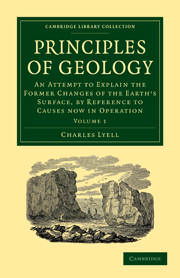 Principles of Geology
Principles of Geology Book contents
- Frontmatter
- Contents
- LIST OF PLATES AND WOOD-CUTS IN THE FIRST VOLUME
- CHAPTER I
- CHAPTER II
- CHAPTER III
- CHAPTER IV
- CHAPTER V
- CHAPTER VI
- CHAPTER VII
- CHAPTER VIII
- CHAPTER IX
- CHAPTER X
- CHAPTER XI
- CHAPTER XII
- CHAPTER XIII
- CHAPTER XIV
- CHAPTER XV
- CHAPTER XVI
- CHAPTER XVII
- CHAPTER XVIII
- CHAPTER XIX
- CHAPTER XX
- CHAPTER XXI
- CHAPTER XXII
- CHAPTER XXIII
- CHAPTER XXIV
- CHAPTER XXV
- CHAPTER XXVI
- INDEX
- Frontmatter
- Contents
- LIST OF PLATES AND WOOD-CUTS IN THE FIRST VOLUME
- CHAPTER I
- CHAPTER II
- CHAPTER III
- CHAPTER IV
- CHAPTER V
- CHAPTER VI
- CHAPTER VII
- CHAPTER VIII
- CHAPTER IX
- CHAPTER X
- CHAPTER XI
- CHAPTER XII
- CHAPTER XIII
- CHAPTER XIV
- CHAPTER XV
- CHAPTER XVI
- CHAPTER XVII
- CHAPTER XVIII
- CHAPTER XIX
- CHAPTER XX
- CHAPTER XXI
- CHAPTER XXII
- CHAPTER XXIII
- CHAPTER XXIV
- CHAPTER XXV
- CHAPTER XXVI
- INDEX
Summary
We have hitherto considered the destroying and transporting power of those atmospheric waters which circulate on the surface of the land ; but another portion which sink deep into the earth, present phenomena essentially different in character. Rivers, as we have seen, remove earthy matter from higher to lower levels, but springs not only effect this purpose, but sometimes, like volcanos, carry matter from below upwards. Almost all springs are impregnated with some foreign ingredients, which render them more agreeable to our taste, and more nutritive than pure rain water ; but as their mineral contents are in a state of chemical solution, they rarely, even when in great abundance, affect the clearness of the water, and for this reason, we are usually unconscious of the great instrumentality of these agents in the transfer of solid matter from one part of the globe to another. The specific gravity of spring water being greater than that of rain, it augments the carrying power of rivers, enabling them to bear down a greater quantity of matter in mechanical suspension towards the sea. Springs, both cold and thermal, rise up beneath the waters of lakes and seas, as well as in different parts of the land, and must often greatly modify the mineral character of subaqueous deposits.
The number of metals, earths, acids, and alkalies, held in solution by different springs, comprehends a considerable portion of all known substances, and recent observations have tended continually to augment the list; but those alone which are most abundant, need be regarded as of geological importance. These are lime, iron, magnesia, silica, alumine, soda, and the carbonic and sulphuric acids.
Information
- Type
- Chapter
- Information
- Principles of GeologyAn Attempt to Explain the Former Changes of the Earth's Surface, by Reference to Causes now in Operation, pp. 198 - 219Publisher: Cambridge University PressPrint publication year: 2009First published in: 1830